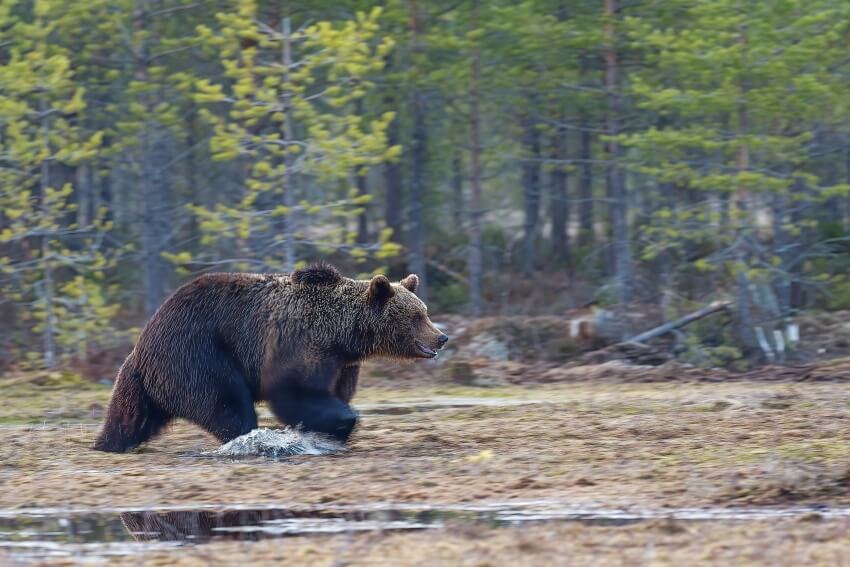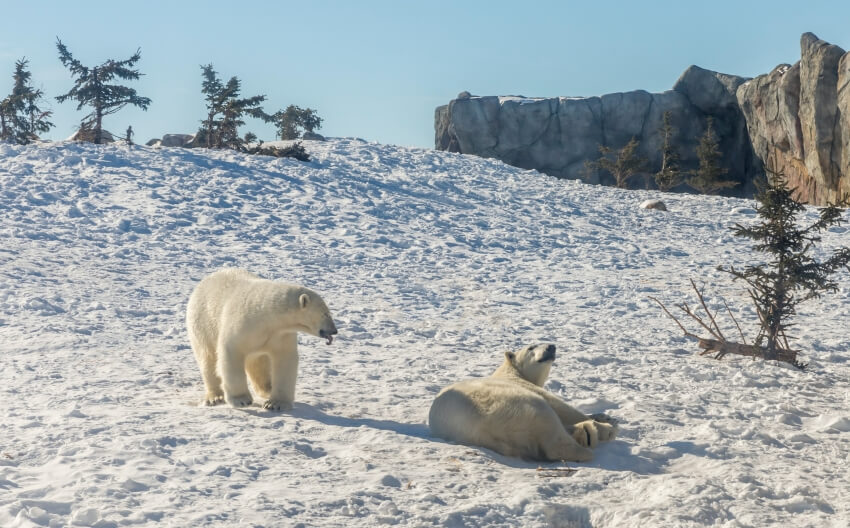The bear wildlife conservation organization is a small but dedicated organization that is committed to preserving the habitats of bears and other animals in the UK. The group was founded and operates primarily out of the United Kingdom, where they are working to create a nature reserve and create programs in helping bears.
- Location: Birmingham, United Kingdom.
- Founded: TBD.
- Species: Asiatic Black Bear, Brown Bear, Giant Panda, Malayan Sun Bear, Northern American Black Bear, Polar Bear, Sloth Bear, and Spectacled Bear.
What is Hauser Bears?

Hauser Bears is a UK-based charity that works to conserve bears around the globe through education and research. Their main focus is on the changing attitudes towards bile farming in South East Asia, the poaching for body parts, and captive bears in the entertainment trade industry such as dancing bears.
The organization approach also produces publications, and other educational materials to raise awareness on this important issue.
Hauser Bear Mission
The Hauser Bear’s mission is to conserve and protect bears worldwide and their habitats. They are committed to working with partners around the world to ensure that the bears will be around for future generations.
Hauser Bears also strives to inspire people to take action to help the bears. The charitable organization committed is an organization that works to conserve and protect the brown bear.
The group operates its mission through education, research, community outreach programs, and habitat protection. They work to meet their goals by constantly studying all aspects of bears. the organization constantly monitors the threats that are facing bear populations around the world.
They also study the best practices for Hauser Bears Ambassadors and management, bears research is carried out by biologists and students from all over the world. The organization has a large network of partners throughout the US which The organization works with to promote community outreach programs.
They are dedicated to working on a long-term project that will benefit the brown bear for generations to come. organizations’ end goal is the conservation of all species of bears and their habitats.
Hauser Bears provides a variety of ways for people to take action in order to help sustain bear populations around the world, Hauser Bears is working hard on building a more sustainable future so that children can enjoy the beauty and majesty of bears.
See Related: Best Conservation Books to Read
Why Hauser Bears Help Bears?
bears worldwide and particularly need help and there are a number of reasons why bears are in danger of extinction and need help from organizations like Hauser Bears.
- Deforestation – Deforestation is the main reason why bears are in danger of extinction. When forests are cleared, bears lose their natural habitat and food sources.
- Hunting – Bears are also hunted for their fur and meat. This puts them at risk of becoming extinct.
- Climate Change – Climate change is causing the Earth to warm up, which is making it difficult for bears to survive. Climate change is a major threat to bears, as it is making it difficult for them to survive. The Earth is warming up, which is causing the habitats of bears to change. This makes it hard for them to find food and places to live. Bears are also being hunted for their fur and meat, which puts them at risk of becoming extinct.
- Poaching – Poaching is another major threat to bears. They are often killed illegally for their body parts, which are then sold on the black market. Poaching is basically what you do to bears to make them extinct that uses bears trapped in entertainment. The organization is unhappy right now because they’re hearing about bear hunters who kill bears for sport.
- Fragmentation – When forests are cleared, bears can’t move freely between habitats; this creates isolated groups of bears with limited gene flow. This poses a major threat to the future of bears, as it makes it difficult for them to mate and reproduce. It also increases the chances of bears becoming extinct.
- Bile Farming – Bile farming is the process of extracting bile from bears for medicinal purposes. This often occurs in Asia, where bear bile is used in Traditional Chinese Medicine (TCM). There are many issues with bile farming, including the unethical treatment of animals, the danger posed to humans by infected bears, and the negative impact on the environment.
Thus, the organization aims to help and protect the bears from these threats that push bears to extinction.
See Related: Causes of Extinction You Should Know About
Projects

Hauser Bears is dedicated to the preservation of various bear species worldwide and particularly in Asia to stop bear farming in South East Asia.
The organization strives to provide research, expertise, and advice on bear safety, ethics, habitat management, and ursine behavior. They are experts at keeping both humans and animals safe.
The charitable organization is committed to working to conserve these animals and save the bears who are worldwide and particularly targets for poaching.
The mission is to save the magnificent animals, which are bears, globally.
It includes bears all over the world such as in Sub-Saharan Africa, Asia, North America (including Alaska), and beyond; species in captivity; and orphaned bear cubs who need rescuing from dangerous situations.
The organization is dedicated to the conservation of bears and their habitats. We work with local communities and governments to create and support effective conservation projects. Some of our main initiatives include:
- Providing education on the importance of bears and their conservation
- Working with governments and local communities to create and enforce laws that protect bears
- Stop and protect bears from bear bile farming
- Supporting projects that conserve bear habitat
- Collaborating with other organizations to support global bear conservation
- Raising awareness on bear poaching worldwide
- Building a global network of Hauser Bears Ambassadors – these ambassadors are people from all over the world that are devoted to helping bears with the organization’s conservation projects.
- Hauser Bears is also committed to providing research about bears
Why bear needs our help?

The Bears need our help to avoid extinction and spread awareness. They are increasingly pushed to extinction due to their populations being hit hard by deforestation, bile farming, and endangerment from South East Asia poaching for the body of these animals.
Climate change has put the Bears in danger as well as the future generation. Because we’ve had less snowfall, earlier ice dams, and break-ups, bears have access to food sources all year round.
Climate change continues to affect many aspects of the bear population worldwide from distribution and behavior changes to reduced cub survival rates – part of a broader set of emerging impacts warns against rapid global warming.
Why does the organization work to stop bear bile farming?
The organization works to stop bile farming by promoting the medicinal properties of the bear’s bile and raising awareness about the welfare of the animals.
They promote healing through Hauser medicines, which are sold in the US, Hong Kong, Singapore, and Haïti.
Hauser Bears Care volunteers support the organizations’ work to particularly targets the issues with orphaned cubs and injured ones.
How can I donate to help bears?
You can help by supporting Hauser Bears in protecting bears worldwide by making a donation on their website or through fundraising. For the adventurous, you can participate in their polar bear expedition in the Arctic.
You can also join exciting events Hauser Bears held such as going on hikes in supporting the organization participating in polar bear expeditions and joining the Hauser Bears on their mission to save bears around the globe while having fun.
FAQs
What’s the biggest threat to extinction for giant pandas?
The biggest threat to extinction for giant pandas is habitat loss. As human populations grow, they encroach upon the panda’s natural habitat, leading to deforestation and fragmentation of bamboo forests. This loss of habitat results in a reduction of the panda’s food sources and breeding grounds, making it difficult for the species to survive.
When did giant pandas become endangered?
Giant pandas became endangered in the 20th century due to human activities such as deforestation and hunting. Their population declined rapidly, and by the 1980s, there were fewer than 1,000 pandas left in the wild. Conservation efforts and breeding programs have helped to increase their numbers, but they are still considered a vulnerable species.
Why are giant pandas hunted?
Giant pandas are hunted for their fur and meat, as well as for traditional medicinal purposes. Despite being a protected species, poaching and illegal hunting still occur in some areas. The demand for panda products, coupled with habitat loss and fragmentation, has contributed to the decline of the species.
What is the main problem of giant pandas?
Giant pandas are classified as an endangered species due to the destruction of their natural habitat, which has been caused by human activities such as deforestation, mining, and urbanization. In addition, their low reproductive rate and limited diet of bamboo leaves them vulnerable to extinction. Conservation efforts have been implemented to protect their habitat and increase their population, but continued human encroachment on their habitat remains a significant threat to their survival.
Related Resources
